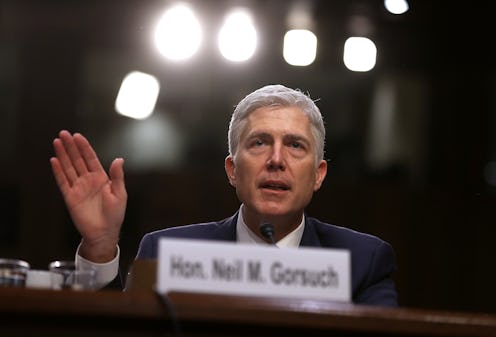News
Gorsuch's Confirmation Is A Catch-22 For Democrats

Neil Gorusch, President Trump's nominee to the Supreme Court, largely avoided serious controversy during his Senate confirmation hearings. But now that Gorsuch is set for a confirmation vote on April 7, many Democrats are faced with a political Catch-22: disappoint their base and risk their own seats by "siding" with Trump, or block Gorsuch and possibly unleash a Pandora's box of political fallout.
When Supreme Court Justice Antonin Scalia died in 2016, his open seat was almost immediately politicized. Republicans preemptively announced their unanimous opposition to anyone President Obama might nominate, arguing that filling SCOTUS vacancies in an election year went against historic precedent. Democrats felt differently, defending Obama's pick Merrick Garland and his right to a confirmation hearing, regardless of timing. That hypocrisy abounded in defenders of both these arguments is par for the D.C. course.
It may be hard to fathom at this moment in history, but for much of the recent past, Supreme Court confirmations have not been so blatantly politicized. Justice Sonia Sotomayor, Obama's first nominee, sailed through the Senate on a vote of 68-31, with 23 percent of Senate Republicans agreeing to her confirmation. Prior to that, a full half of Senate Democrats supported Justice John Roberts, nominated by President Bush.
The Democrats opposing Gorsuch have offered a few explanations for their dissent, falling into three categories. First, they've cited specific case rulings they disagree with, one in which Gorsuch's ruling seemed to benefit a big corporation over "the little guy." Second, they've raised concerns about Gorsuch's "originalist" views, meaning he interprets the Constitution as it was originally understood at the time of its writing. And finally, some Dems are concerned about supporting anyone put forth by Trump.
All of these are fairly lightweight complaints. For starters, any judge with any record at all will have rulings that can be read as heartless or unfair. And it should go without saying that any judge nominated by a Republican will probably hold views that Democrats oppose, and vice versa. The aim is not ideological alignment, but whether or not this person has a record of thoughtful, lawful rulings he or she can explain.
And as far as opposing anyone Trump nominates, Democrats might have a hard time keeping that up for four long years. Especially given that they excoriated Republicans for doing much the same in ignoring the nomination of Merrick Garland. There's been plenty of speculation that payback for what Republicans did in refusing to consider the nomination of Garland is in fact the real factor behind Democratic opposition. But again: four years is a long time.
Sen. Lindsey Graham pointed this change out, saying "What has happened over time is that somehow, some way, we’ve gone from Scalia the originalist getting 98 votes, [Justice Ruth Bader] Ginsburg, the bastion of liberalism on the court, well-qualified, getting 96 votes. What’s happened? Did the Constitution change? I don’t think so. I think politics has changed.”
Perhaps the most concerning potential disaster from an all-out Democratic opposition to Gorsuch would be Senate Majority Leader Mitch McConnell going for the "nuclear option." As of now, SCOTUS nominees essentially need 60 votes in order to be confirmed. Ergo, even with a simple majority, the controlling party in the upper chamber cannot push through whoever they want — they need at least a few members of the opposition on board. But Sen. Harry Reid went nuclear by changing Senate filibuster rules for judicial nominees back in 2013, and that may be enough cover for McConnell to do the same for Gorsuch.
Should such a change be enacted, a Republican-controlled Senate could confirm not just Gorsuch, but possibly further SCOTUS seats that open up. If a liberal justice retires or passes away in the next three years, Republicans could tip the Supreme Court to a conservative bent by putting a second, perhaps much more ideological judge on the bench.
On the other hand, Democrats have a lot to lose by voting for Gorsuch. The base of involved and motivated left-wing voters is decidedly against confirming anything Trump does or says. Included in that opposition are people who Trump nominates to the Supreme Court. To that end, Gorsuch is being judged not based on the simple evaluation of his judicial cred, but more as an opportunity for the symbolic slap back at an administration many progressives view as uniquely threatening to their policy goals.
And the one thing you don't want to do as a politician is upset the base. They're the ones who show up during mid-term elections, the volunteers who work the phones at campaign offices. They're also funneling huge sums of money to Democrats in the form of small donations on a large scale.
Many Democrats have already said they'll oppose Gorsuch, some in an about-face that seems to have caught Republicans off guard. A full 26 Senate Democrats have said or implied they would filibuster Gorsuch.
And yet, confirming Gorsuch is the only obvious way Democrats can avoid a Senate rule change that could give Republicans an even more conservative future Supreme Court. The only way to appease their base is to do exactly the opposite. It's not an easy week to be a Senate Democrat.